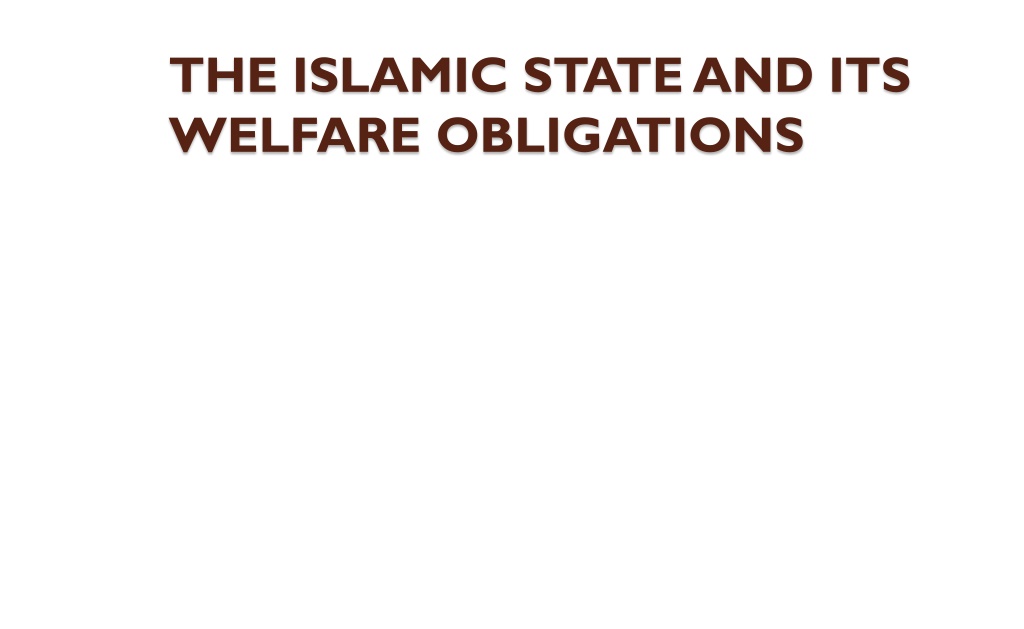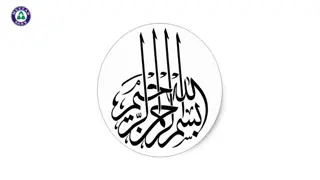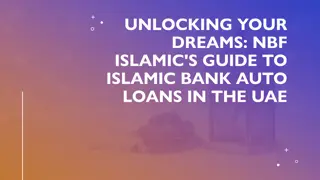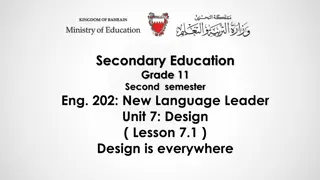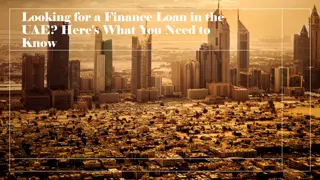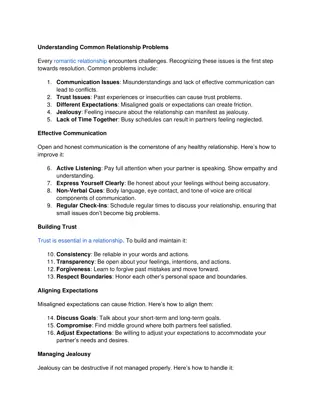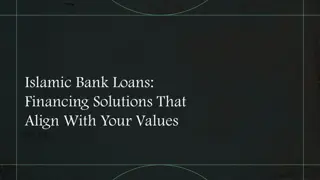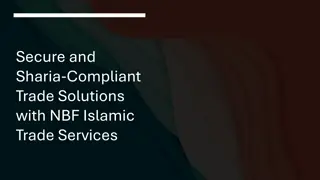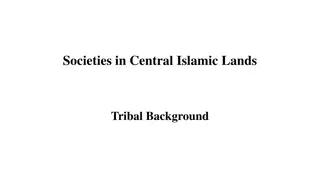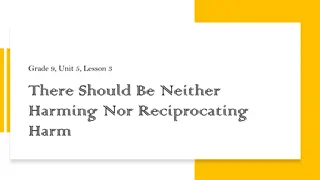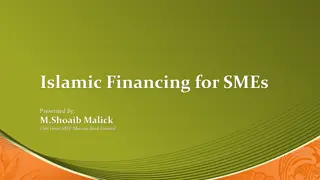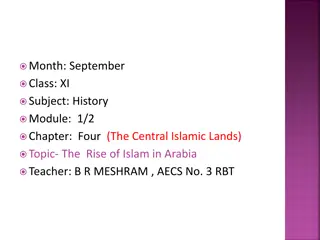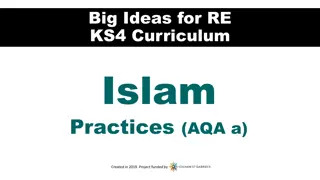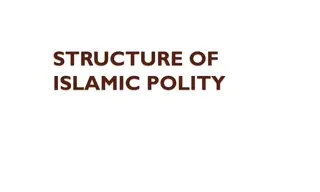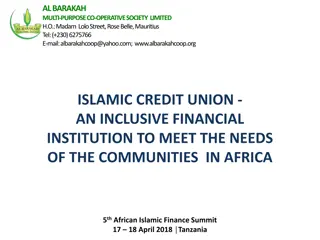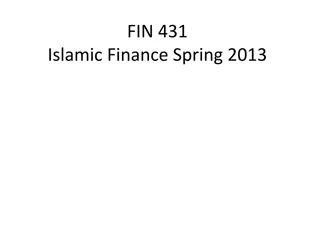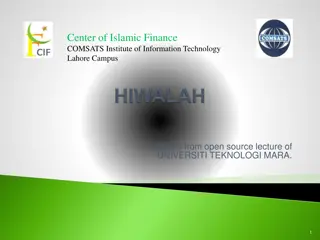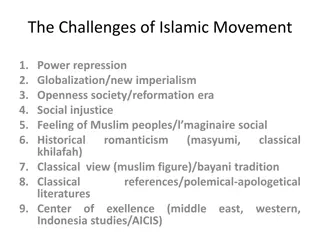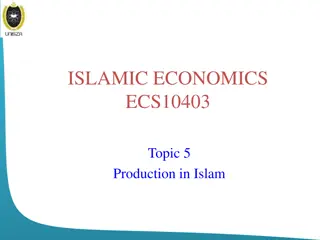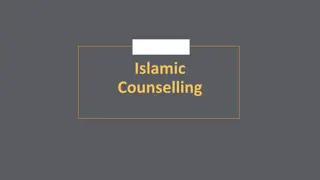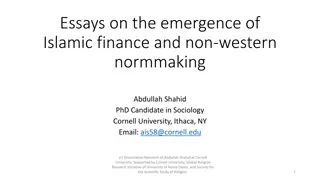The Historical Significance of the First Islamic State in Medina
The Islamic State in Medina established by Prophet Muhammad marked the beginning of a new era in Islamic history. It was the first welfare state, where divine teachings were implemented under his guidance. This state pioneered the integration of spiritual and temporal authorities, setting the foundation for a socio-political and economic model based on divine directives. The state's influence expanded rapidly, impacting surrounding regions and shaping the lives and ideals of its inhabitants. The personality of Prophet Muhammad played a key role in transforming his companions and catalyzing the state's growth.
Download Presentation

Please find below an Image/Link to download the presentation.
The content on the website is provided AS IS for your information and personal use only. It may not be sold, licensed, or shared on other websites without obtaining consent from the author. Download presentation by click this link. If you encounter any issues during the download, it is possible that the publisher has removed the file from their server.
E N D
Presentation Transcript
THE ISLAMIC STATE AND ITS WELFARE OBLIGATIONS
The first welfare state When the persecution and atrocities of Makkan s increased beyond limits, the holy prophet Muhammad (P.B.U.H) was asked by Allah to migrate to Madina, after thirteen years of preaching and calling to the way of Allah in Macca
With migration to Madina, a new era of Islamic history started. The Muslim got a practical chance to implement the divine teachings and way of life under the supervision and guidance of the holy prophet Muhammad (pbuh).
Political scientists say that any legal system with out political sovereignty is meaningless, similarly laying the foundations of a state in Madina was necessary for the new creed as a complete way of life and the holy prophet laid the foundations of an Islamic state at Madina, was the first welfare state in the history of man kind, run by human beings, the vicegerent of God on the earth, under the divine socio- political and economic directives.
This was the first practice of an Islamic state in the city of Madina and where the holy prophet (pbuh) had united the temporal and spiritual authorities in his person under divine commands.
This initial experiment slowly expanded to the surrounding areas, to Makkah after its conquest and then the nearby tribes. Within a period of a decade, after the Holy Prophet (pbuh) this state expanded to the entire Mesopotamia and the big empire Iran, conquered by the Muslim armies.
The personality of the Holy Prophet (pbuh) and the way he brought up his companions, brought a total change in their lives, personalities, economic and political ideals and every other aspect of social life. This change had far-reaching impacts on furthering the expansion of the state.
After the Holy Prophet (PBUH) his close companion and aide Abu-Bakr Siddique (RA), was selected as the Caliph of the Muslims. This was period of internal and external turmoil and there were many challenges to the nascent state of Islam but he managed not only to quell the internal instabilities but also the external threats and maintained the Islamic state and succeeded in its expansion as well.
Abu-Bakr (RA) was followed by Omar bin Al-Khitab (RA) as the 2ndCaliph. He was born in Makkah. It was his Caliphate when the Islamic state was transformed into a world power and where he consolidated the foundations of the welfare state and provided the citizens with services and facilities centuries ago, which are today considered as the characteristic of a welfare state, in modern times.
Catering to the welfare of the citizens and relieving them of hardships is the basic objective of the Islamic state
education, health, rural development, roads and buildings, communications, agriculture, public health, sanitation , income maintenance, child welfare, welfare of the senior citizens, law and order, and any other aspect of material and social well being.
Human being is made up of matter clay[1] and Islam wants and orders his material well being. But this clay or matter is infused with a soul as well, and matter and soul (spirit) comprise an indivisible human being., free but responsible to God for all its actions within the frame work of divine guidance , obliged to fulfill its obligations as a vicegerent of God on earth. [1] Al-Quran (Al Hajr) 15:26. we created man from sounding clay.
Man is not only a member of the brotherhood of Islam, but also a member of the brotherhood of mankind. Man s material and spiritual needs are therefore, necessary and indivisible. Thus God has sent a chain of prophets for the fulfillment of spiritual needs and also provided resources for material needs.
God created everything on, in and above the earth and made them subject to the humans[1]. Al-Quran(2:29) It is He who created for you all things that are on the earth. , Al-Luqman (31:20), Do you not see that God has subjected to you all things in the heavens and on the earth and has made his bounties flow to you in exceeding measures , both seen and unseen, Al-Ibrahim (14:32) and made subservient to you day and night , the sun and moon and the rivers/canals, Al-Nahal (16:12-14), It is He who has made the sea subjected to you that you may eat fresh and tender meat.
All these resources on, in and above the earth are for human beings and not for any particular privileged group or class or country; and it can therefore also be inferred that they are meant for general welfare- the eradication of poverty and fulfilling the basic material needs of all humans beings is the prime obligation of an Islamic state.
FUNCTIONS Some welfare functions of an Islamic state 1. Eradication of poverty 2. Maintenance of socio-economic justice and law and order 3. Social security and equitable distribution of income and wealth 4. Provision of educational services 5. Human resource development 6. Protection & conservation of wild life
1.Eradication of Poverty What is poverty? *the state of not having enough money to take care of basic needs such as food, clothing, and housing
Poverty,condition of having insufficient resources or income. In its most extreme form, poverty is a lack of basic human needs, such as adequate and nutritious food, clothing, housing, clean water, and health services. EXTREME POVERTY,which threatens people s health or lives, is also known as destitution or absolute poverty. having an annual income that is less than half of the official poverty line. Extreme poverty in developing nations means having a household income of less than U.S.$1 per day. RELATIVE POVERTYis the condition of having fewer resources or less income than others within a society or country, or compared to worldwide averages.
Eradication of Poverty = Poverty Alleviation The basic aim of poverty alleviation is to create conditions for full employment and a high rate of growth which in turn provide source of livelihood to many in a society.
As already mentioned, all the resources on, in and above the earth are made subservient to human beings on trust from Allah, the Creator. It is the duty of the trustees to enjoy and deploy these resources in the best interest of human welfare, including improving material well being and thus eradicating poverty, which is a social evil and is seen as the sources of all other social problems.
How to eradicate poverty? A way of eradicating poverty is to provide a regular source of income through employment and the avoidance of conditions generating deficient or excess demand and leading to unemployment or inflation. Economic well-being is not an isolated phenomenon and should be viewed against its negative impacts on the moral fabric of human society, on social and economic justice and on overall human welfare. 1. regular source of income
The eradication of poverty leads to the concept of controlled economy. The un-disciplined and un-guided interplay of market forces may not work out for the best of all strata of the society, and the Islamic state, in order to protect the interest of majority , should therefore resort to planning and control of the market and economy. 2. controlled economy
Market control does not mean regimentation* or unscrupulous~ control of the private sector, rather than to minimize laissez-faire-ism** and play an active role guiding and regulating demand so that occurrence of recession or inflation is avoided. ~not restrained by moral or ethical principles **refusal to interfere in other people's affairs, or the practice of letting people do as they wish *strict organizational control
3. cheat The holy prophet (pbuh) has said, Those who cheat others in selling and buying , are not from amongst us[1]. The holy Quran commands us not to give short measures and weight and to establish weight with justice[2]. An Islamic welfare state , therefore, must keep an eye on prices, weight and measures and the quality of good and services. [1] Sulaiman Bin Ashaat, Sunan Abu Daud .Vol-II, Translated by Ahmad Hussain, Kitab Bhawan, New Delhi.pp.982, 3445. [2] Al-Quran ( 11:84 Hood, 55:9 Al-Rahman)
Hoarding is also forbidden in an Islamic state. The prophet (pbuh) has said that whomsoever withholds a particular commodity or commercial article, is a sinner[1] and that if some one holds grain with the intension that its prices will go up and he will earn more money from the Muslims, such a person is a sinner[2]. [1] Muslim Bin Al-Hajaj, Saheeh Muslim Vol-III (Kitabul Buyu) Translated by Abdul Hameed Siddiqui,1987, .Sh Muhammad Ashraf Lahore. Pp. 845, 3910. [2] Ibid. 4. Hoarding
Related to the economy in particular and social development in general, is the concept of the development of physical and social infrastructure*, as necessary as capital for a business, and which ultimately leads to the general prosperity of the society as a whole. Investment in necessary infrastructure development leads to economic development directly. *large-scale public systems, services, and facilities of a country or region that are necessary for economic activity, including power and water supplies, public transportation, telecommunications, roads, and schools 5. infrastructure
Therefore, it is the duty of an Islamic State to provide such facilities in the shape of roads, highways, bridges, dams, market places, irrigation channels, air ports, sea ports, shipping yards, water ways for cheap transportation and communication, industrial sites, power generation, etc. This helps not only in the development of the economy but represents a form of direct public welfare. It not only helps boost the economy but also provides jobs and a source of income for many.
2. Maintenance of Socio-economic justice and Law and Order The practical expression of the protection of life, property and honour, lies in the legal institutions and the provision of the socio-economic justice to citizens in an Islamic state. Human beings are gregarious by nature, and the social process leads to competition, conflicts and the abuse of powers. In a state where there is no concept of accountability and impeachment of the powerful, human beings suffer and society becomes a human jungle where the principles of the survival of the fittest operates.
Islam has accorded justice an eminent position in its legislation. There are many verses of the Quran, where Allah orders justice and kindness and has forbidden wickedness and indecency[1]. Muslims are ordered to do justice between people when they have authority to judge. Even if their own family or relative s interests are at stake, they might not give up justice[2]. 1. [1] Al-Quran (Al-Nahal (16:90), [2] Al-Quran (Al-Nisa) 4:135), O, you who believe ! be firm in justice as witness for Allah , even in case against your self, your parents and your kin. JUSTICE
In connection with socio-economic justice Islam orders not to discriminate on the basis of language, race, colour, region and religion. The standard of excellence with Allah is RIGHTEOUSNESS rather than race, blood, colour or geographical boundaries [1] and the holy Prophet (pbuh) has also prohibited such discrimination[2]. 2. [1] Al-Quran, (Al-Hujrat) (49:13) The nearest to Allah amongst you is one who is pious. [2] Ghulam Ahmad Hareeri, 1981, Islami Dastur-e- Hayat . Lahore. Polymer publications.p.34. NON-DISCRIMINATION
Discrimination on the basis of religion is also prohibited in Islam and thus in an Islamic state. Quran says that there is no compulsion with respect to religion[1]. This leads us to the concept of treatment with minorities, a topic which has been alive throughout history, in connection with rights and freedom of religion. 3. TREATMENT WITH MINORITIES [1] Al-Quran ( Al-Baqara) 2: 256. let there be no compulsion in religion.
Islamic history witness three types of minorities 1. those who accepted citizenship of the Islamic state through contracts or agreements, 2. those who were defeated in the battle and were wiling to pay protection money, a type of tax levied on non-Muslims for their protection called Jaziyah 3. and those who joined the Islamic state of their free own will.
Treatment with the first category was strictly in accordance with the terms and conditions of the agreement; the second category were given full protection of life and property and honour and were retained on their lands as owners, but the able bodied men among them (other than those who joined the Islamic army or any other state service) were charged a nominal tax in accordance with their economic conditions. The third category enjoyed all rights due to them in the Islamic state, including protection of life, property, honour, employment and social security, and almost every facility the state provided to Muslims. Criminal laws were applied to them as to Muslims, though personal matters were settled according to their own laws, and Islamic laws were not applied in such matters except when were requested for [1] 1. 2. 3. [1] Syyed Abul Ala Maududi, 1967, Islami Riasat (2nd edn). Lahore; Islamic Publication. Pp.178-95
Socio-economic justice also encompasses the rights of laborers and servants. The holy prophet (pbuh) said: I shall be the enemy of three persons on the day of judgment ;and when I come to fight some one I defeat him. One of these three persons is one who keeps a laborer on daily wages , makes him work for him the whole day but does not give him wages relevant to his labour[1]. [1] Muhammad bin Ismail Al-Bukhari,Cf, Jaleel Ahsan Nadvi ,1987, Rah-i- Amal. Lahore. Islamic Publications. 4. THE RIGHTS OF LABORERS AND SERVANTS
It is the responsibility of an Islamic state to fix minimum wages in accordance with the general living standard, and to impose justice and strive for quality of individuals before the law[1]. 5. MINIMUM WAGES
There is no difference between poor and rich, black and white, ruler and ruled, and no discrimination on the basis of colour or status. The only criterion for man s worth is his character, ability, and piety before Allah[1]. God does not look at your faces, nor bodies nor wealth, he looks at your hearts and your deeds[2]. An Islamic state therefore, has the prime concern of securing prompt socio-economic justice and equality. Quran has described the duty of the prophet as I am commissioned to judge justly between you[3]. [1] Al-Quran ( Al-hujrat) , 49:13. Amongst you the nearest and the respected to Allah is one who is pious. [2] Muslim Ibn Al-hajaj, Saheeh Muslim. Vol-IV . Transalted by Abdul hameed Siddiqui,1987.. lahore: Sheikh Muhammad Ashraf pp.1362; 6221. [3] Al-Quran 9l-shura) 42:151.
3. Social Security and Equitable Distribution of Income and Wealth One of the biggest function of an Islamic state is the provision of the basic necessities and requirements to its citizens. Besides the protection of life , property and honour of its citizens, it is the obligation of an Islamic state to provide them with food, shelter, clothing and other basic necessities of life and to ensure a respectable standard of living for every individual , who is unable or made unable to take care of his own needs and requires assistance. Security provided to somebody who is retired, unemployed, or unable to work.
Islam is committed to the social and economic justice and eradication of the gross inequalities of income and wealth which destroy the feelings of brotherhood and sympathy that Islam wants to create. In an Islamic welfare state all the resources of income and wealth are gifts of God to all human beings[1]. [1] Al-Quran 2.29. It is he who has created all things for you on the earth.
This means Islam emphasizes justice and incorporates it into its system programs of redistribution of income and wealth, so that every person be guaranteed a standard of living which is humane and behooves the status of a vicegerent of Allah on the earth. Any Muslin society which, fails in this basic and fundamental task and function, is not worth of the name Islam.
This distributive justice contains, in the contemporary socio-economic sense, the following five elements;- 1. Training, assistance in and or provision of full and gainful employment to those looking for work according to their ability. 2. A system of just remuneration or wages for that work. 3. Making compulsory arrangements for insurance against unemployment, and occupational hazards , old age pension, survivors benefits etc. 4. Provide assistance to those who because of disability, physical or mental handicap, or adolescence, are unable to support themselves or to attain a respectable standard of living by their own efforts and Collecting and distributing Zakat, and enforcing Islamic teachings related to the division of estate of a deceased person to accelerate the distribution of Income and wealth in Muslim society so that, in the words of Quran, wealth does not continue to circulate merely among your rich[1] . 5. [1] Al-Quran, Al-Hashar,(59:7), What Allah has bestowed upon his messenger and (taken away) from the people of township, belong to Allah and His apostle, , and kindred and orphans, the needy and way farer, in order that it may not (merely) make a circuit between the wealthy among you.
The Holy Prophet (pbuh) who founded the first welfare state at Madina, has clearly said that he who leaves dependents behind, they are our responsibility and that the rulers (state) is the supporter of anyone who has no supporter. The Quranic verses and Ahadith of the holy prophet can be the foundation of the social security in any country called themselves Islamic.
In order to finance these social security measures, the Islamic state has the main source of ZAKAT, in addition to the other normal sources of revenue from taxation, natural resources, imports, exports, etc. Zakat is not a tax, as a tax can be spent on state expenditures but Zakat can only be spent on specified heads mentioned by Quran.
4. PROVISION OF EDUCATIONAL SERVICES Seeking knowledge is mandatory for each Muslim man and woman. In an Islamic state it is the responsibility of the state to help people achieve this goal. The Islamic welfare state must provide the citizens with facilities for education. The education should consist of learning the Quranic teaching, Islamic laws, modern sciences, and bringing up the young generation according to Islamic values. Science and technology (wisdom) are the lost property of Muslims and they are supposed to pick them up when and where they find them.
They are supposed to acquire useful knowledge and pass it on to others. It is important to note that Islam does not divide education into religious and secular. Every branch of knowledge is religious if it is obtained to seek the pleasure of Allah and used for the uplift of human beings. Do you equate those who know and those who do no know Quran: 39:9
For example, in the person of Ibn Sina, you had someone who had written al-Isharat on philosophy and metaphysics, and also al-Qanun fi t-Tibb on medi- cine, a book whose Latin translation was used as a text in western universities till two centuries ago! Imam al-Ghazali also wrote on Philosophy and Shariat
5.Human Resource Development Education and health which are termed as social capital or human development, is the most emphasized area of an Islamic state. Among the divine religions Islam has pleaded more for seeking knowledge. In this regard Quran equivocally says that Do you equate those who know and those who do no know
Investment in Education sector is very much important. The concept of education is different for the developing and developed world. In developing countries like our, it refers to increase the level of literacy as it is the mean to education but not an end in its self.
Islamic state is bound to provide for education both for men and women. The general purpose of education in an Islamic state should be the preparation of the citizens to conform to the social ideals of the state. It should introduce a change and teach new skills ad techniques.
It should inculcate in the seeker the basic morality required to serve the humanity, spirit of hard work, efficiency, economyand frugality so that it be useful not only for the seeker but also for the society at large. effectiveness Not wasting resources
